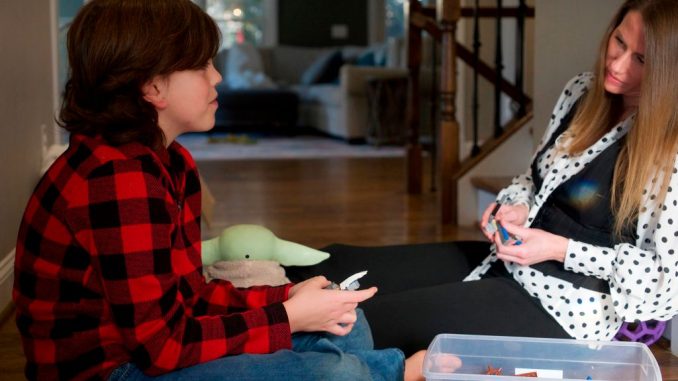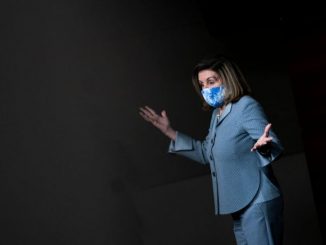

NEWPORT BEACH, Calif.—In response to the growing demand for mental health services, Hoag Hospital has launched a young adults mental health program.
Developed by neurobehavioral health experts at Hoag’s Pickup Family Neurosciences Institute, the accredited outpatient program is meant to address the impact of pandemic shutdowns on mental health of young adults aged 18-26.
The eight-week program will meet in person, three days a week, helping participants to build relationship skills, which experts say can improve efficacy in school, work, and interpersonal situations.
Mental health advocates have said the challenges of transitioning into adulthood have been compounded with the abnormal effects of the pandemic, resulting in a significant rise in depression, anxiety, trauma, and other mood-related disorders or mental health issues.
“Everyone’s suffering, whether it’s mom, dad, siblings… I’ve never been this busy before, not even close,” physiatrist and program director Dr. Sina Safahieh told the Epoch Times.
Experts at Hoag said that the negative impact the pandemic has had on young adults will be felt for years to come, and that a program to addresses the effects of the unusual and unexpected crisis is critical to helping them navigate the rough seas ahead.
“As a psychiatrist, I have never seen this level of anxiety and depression in the community as I have over the past year,” Dr. Michael Brant-Zawadzki, Hoag’s senior physician executive, said in a press release. “It is imperative, now more than ever, to offer a program that supports those transitioning to one of the most crucial stages of life.
“Our program will help young adults build their own identity and empower them to better meet the stresses and pitfalls common to this stage of life.”
An experienced, interdisciplinary treatment team will lead the young adults mental health program with emphasis on equipping young adults with the tools to adopt coping strategies and build healthy relationships through the use of dialectical behavior therapy and cognitive behavioral therapy in a group setting.
A key focus of the program is improving participants’ sense of self, enabling them to better incorporate strategies around emotional regulation and distress tolerance. Individuals will learn how to apply effective coping skills to their day-to-day lives.
Pandemic Fallout
With May being Mental Health Awareness Month, many who work in the mental healthcare sector are taking the opportunity to advocate and educate the public about the mental health issues associated with the pressures and tragedies of the pandemic lockdowns.
According to the National Alliance of Mental Illness (NAMI), prior to 2020, one in five adults in the United States reported having a mental health condition. Current research shows the figure may today be closer to two in five or higher.
NAMI’s message is that no one experiencing a mental health condition should feel alone, and that mental health professionals need to get ahead of the looming widespread mental health concerns.
“Over the last year, we’ve experienced unparalleled levels of grief, trauma, uncertainty and isolation, and while there is a light at the end of the tunnel, we have much work to do,” NAMI chief executive Daniel H. Gillison Jr. said in a press release.
To that end, NAMI launched the You Are Not Alone campaign focused on connecting people to resources or free online support groups. The campaign builds connection and increases awareness through digital tools, such as social media platforms, the NAMI blog and COVID-19 information and resources.
Working it Out
Safahieh recommends that people of all ages engage in regular exercise to mitigate stress, anxiety and depression, and improve brain health or neuroplasticity.
As the director of mental health programs at Hoag, as well as a team psychiatrist for professional athletic organizations such the Los Angeles Chargers, Safahieh knows how hard it can be to incorporate workouts into a busy schedule.
“Studies show that at least 90 minutes of cardio a week for some patients can be just as effective as medication when it comes to low-to-moderate grade anxiety and depression,” Safahieh said.
“Personally, I’m a huge advocate of exercise, it’s crucial for me, it’s like my form of medication. As a doctor, you want to practice what you preach. I tell kids and young adults ‘you have to make time for exercise, it’s not going to make time for you.’”
Learning to Cope
As part of Mental Health Awareness Month, various Orange County school districts are providing some creative avenues to raise awareness and mitigate the stigma that surrounds those who suffer from mental health issues.
“We have a district-wide spirit week to draw awareness to mental health,” Laguna Beach Unified School District spokesperson Shelley Spessard told The Epoch Times via email. “We also are launching a public service announcement at the end of the month.”
A “Celebrating Mental Health and Wellness” week is being presented by the Santa Ana Unified School District with virtual afternoon events offering mental health presentations by keynote speakers, yoga, exercise, art, journaling and poetry workshops.
Newport-Mesa Unified School District held a free Virtual Day of Wellness May 8.
“Unfortunately, there’s going to be long-term mental health ramifications for years to come so whether it’s virtual or in-person, counseling, education and self-care are all crucial when it comes to dealing with the psychological effects of the pandemic,” Safahieh said.
“With more access to mental health programs like the one at Hoag, the stigmatization of mental health is dissipating, so there are some silver linings here.”
“It’s not going to dissipate overnight but it’s not going to be forever either.”





Be the first to comment